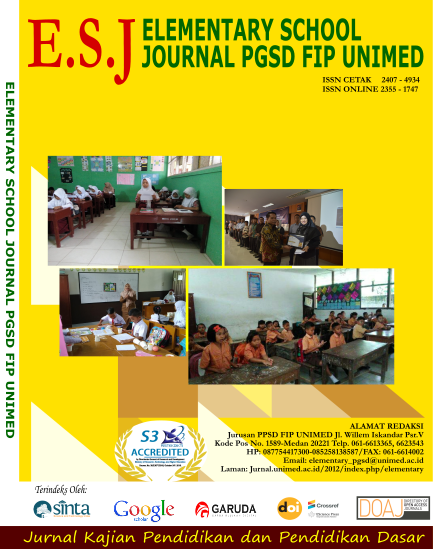Is It A Good Move To Release Policy Of Making English Language As Optional Subject In Elementary School?
DOI:
https://doi.org/10.24114/esjpgsd.v13i1.43963Abstract
Merdeka Curriculum or in Indonesian Language known as Kurikulum Merdeka is widely considered as the most popular curriculum applied in many educational institutions in Indonesia. In the context of elementary school, Merdeka curriculum places English Language as an optional subject offered to students. In fact, nowadays students as the future generation live in the digitized and network based community where English plays a critical role to help them adapt to the rapid change of technology and science. Consequently, it is crucial to study this government policy in the Merdeka curriculum on the English language subject for elementary students. This study aims to analyze the government policy on placing the English language as an optional subject in elementary school using the theory of language development and the role of English as lingua franca in the 21st century. This study applies a library research method and data are collected from published and unpublished scientific articles, analytical journals, government reports and national scale newspapers that are relevant to the aims of the study.Keywords: Merdeka Curriculum, English Languange, Elementary SchoolReferences
Angga, A., Suryana, C., Nurwahidah, I., Hernawan, A. H., & Prihantini, P. (2022). Komparasi Implementasi Kurikulum 2013 dan Kurikulum Merdeka di Sekolah Dasar Kabupaten Garut. Jurnal Basicedu, 6(4), 5877“5889. https://doi.org/10.31004/basicedu.v6i4.3149.
Ariantini, K. P., Suwastini, N. K. A., Adnyani, N. L. P. S., Dantes, G. R., & Jayantini, I. G. A. S. R. (2021). Integrating Social Media into English Language Learning: How and to What Benefits According to Recent Studies. NOBEL: Journal of Literature and Language Teaching, 12(1), 91“111. https://doi.org/10.15642/NOBEL.2021.12.1.91-111.
Bedir, H. (2019). Pre-Service ELT Teachers™ Beliefs And Perceptions On 21st Century Learning And Innovation Skills (4Cs). Journal of Language and Linguistic Studies, 15(1), 231“246. https://doi.org/10.17263/jlls.547718.
Carayannis, G. E., & Morawska-Jancelewicz, J. (2022). The Futures of Europe: Society 5.0 and Industry 5.0 as Driving Forces of Future Universities. Journal of the Knowledge Economy, 13, 3445“3471. https://doi.org/10.1007/s13132-021-00854-2.
Chalkiadaki, A. (2018). A Systematic Literature Review Of 21st Century Skills And Competencies In Primary Education. International Journal of Instruction, 11(3), 1“16. https://doi.org/10.12973/iji.2018.1131a.
Dewi, N. P. A., Sintadewi, M. D., & Suryantini, M. D. (2023). Urgency of Teaching English to Young Learners in Kurikulum Merdeka Belajar. Riwayat: Educational Journal of History and Humanities, 6(1), 110“117. https://doi.org/10.24815/jr.v6i1.29427.
ErdoÄŸan, V. (2019). Integrating 4C Skills of 21st Century into 4 Language Skills in EFL Classes. International Journal of Education and Research, 7(11), 113“124.
Ernawati, Y., & Rahmawati, F. P. (2022). Analisis Profil Pelajar Pancasila Elemen Bernalar Kritis Dalam Modul Belajar Siswa Literasi dan Numerasi Jenjang Sekolah Dasar. Jurnal Basicedu, 6(4), 6132“6144. https://doi.org/10.31004/basicedu.v6i4.3181.
Faridatuunnisa, I. (2020). Kebijakan dan Pelaksanaan Pembelajaran Bahasa Inggris untuk SD di Indonesia. In Seminar Nasional Pendidikan, 1(1), 191“199.
Istiningsih, G., & Dharma, D. S. A. (2021). Integrasi nilai karakter diponegoro dalam pembelajaran untuk membentuk profil pelajar pancasila di sekolah dasar. Kebudayaan, 16(1), 25“42.
Kemendikbud. (2022). Profil Pelajar Pancasila. ditpsd.kemdikbud.
Kim, S., Raza, M., & Seidman, E. (2019). Improving 21st-Century Teaching Skills: The Key To Effective 21st-Century Learners. Research in Comparative and International Education, 14(1), 99“117. https://doi.org/10.1177/1745499919829214.
Linnenluecke, M. K., Marrone, M., & Singh, A. K. (2020). Conducting Systematic Literature Reviews and Bibliometric Analyses. Australian Journal of Management, 45(2), 175“194. https://doi.org/10.1177/0312896219877678.
Mabuan, R. . (2017). Developing esl/efl Learner™s Public Speaking Skills Through Pecha Kucha Presentations. English Review: Journal of English Education, 6(1), 1“10. https://doi.org/10.25134/erjee.v6i1.765.
Maili, S. N. (2018). Bahasa Inggris Pada Sekolah Dasar: Mengapa Perlu dan Mengapa Dipersoalkan. JUDIKA (Jurnal Pendidikan Unsika), 6(1), 23“28. https://doi.org/10.35706/judika.v6i1.1203.
Mappiasse, S. S., & Sihes, A. J. B. (2014). ). Evaluation of English as a Foreign Language and Its Curriculum in Indonesia: A Review. English Language Teaching, 7(10), 113“122.
http://doi.org/10.5539/elt.v7n10p113.
Marouli, C. (2021). Sustainability Education For The Future? Challenges and Implications For Education and Pedagogy in the 21st Century. Sustainability, 13(5), 2901. https://doi.org/10.3390/su13052901.
Nuriyah, L. (2021). Evaluasi Program Pembelajaran Bahasa Inggris di Sekolah Dasar. Jurnal Ilmiah Wahana Pendidikan, 7(8), 397“405. https://doi.org/10.5281/zenodo.5773190.
Rahmadayanti, D., & Hartoyo, A. (2022). Potret Kurikulum Merdeka, Wujud Merdeka Belajar di Sekolah Dasar. Jurnal Basicedu, 6(4), 7174“7187. https://doi.org/10.31004/basicedu.v6i4.3431.
Rao, P. . (2019). The Role of English As A Global Language. Research Journal of English, 4(1), 65“79.
Rintaningrum, R. (2015). Bahasa Inggris Tidak Perlu Dihapus dari Kurikulum 2013 Sekolah Dasar. In Proceeding Seminar Nasional ADPISI, 124, 133.
Sari, M., & Asmendri, A. (2020). Penelitian Kepustakaan (library research) dalam Penelitian Pendidikan IPA. Natural Science: Jurnal Penelitian Bidang IPA Dan Pendidikan IPA, 6(1), 41“53. https://doi.org/10.15548/nsc.v6i1.1555.
Sima, V., Gheorghe, I. G., Subić, J., & Nancu, D. (2020). Influences of The Industry 4.0 Revolution on Human Capital Development and Consumer Behavior: A Systematic Review. Sustainability, 12(10), 4035. https://doi.org/10.3390/su12104035.
Suhandi, & Robi™ah, F. (2022). Guru dan Tantangan Kurikulum Baru: Analisis Peran Guru dalam Kebijakan Kurikulum Baru. Jurnal Basicedu, 6(4), 5936“5945. https://doi.org/10.31004/basicedu.v6i4.3172.
Van Laar, E., Van Deursen, A. J., Van Dijk, J. A., & de Haan, J. (2020). Determinants Of 21st-Century Skills And 21st-Century Digital Skills For Workers: A Systematic Literature Review. Sage Open, 10(1), 1“14. https://doi.org/10.1177/2158244019900176.
Yonata, F., Rukmini, D., Fitriati, S. W., & Suwandi, S. (2022). Profil Pelajar Pancasila dan Pendidikan Warga Negara Lintas Budaya (Intercultural Citizenship Education) pada Pembelajaran Bahasa Inggris. In Prosiding Seminar Nasional Pascasarjana (PROSNAMPAS), 5(1), 381“387.
Zein, M. . (2017). Elementary English Education in Indonesia: Policy Developments, Current Practices, and Future Prospects: How has Indonesia Coped with the Demand for Teaching English in Schools?. English Today, 33(1), 53“59. https://doi.org/10.1017/S0266078416000407.
Downloads
Published
Issue
Section
License
Copyright (c) 2023 Nina Afria Damayanti

This work is licensed under a Creative Commons Attribution 4.0 International License.

Elementary School Journal PGSD FIP UNIMED is licensed under a Creative Commons Attribution 4.0 International License.
ESJ : Elementary School Journal PGSD FIP UNIMED by PGSD Universitas Negeri Medan. p-ISSN : 2407-4934 | e-ISSN : 2355-1747

